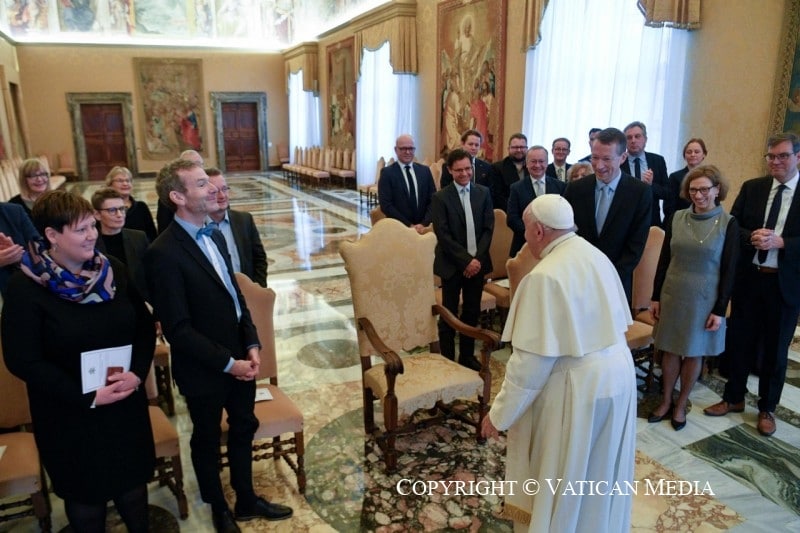Communication, in these days marked by fake news and provocative statements, stands as a beacon of hope. Therefore, as defenders of the faith and bearers of a message of peace, it is essential to support the disarmament of language. We must be bridge builders, willing to listen and engage in respectful communication, thus modeling “kind and prophetic” communication, as I expertly expressed on the LVII World Communications Day.
This morning, in the Vatican Apostolic Palace, the Holy Father Francis received in audience a delegation from the Society of Catholic Publicists of Germany (Gesellschaft Katholischer Publizisten Deutschlands) on the 75th anniversary of its foundation.
We publish below the text of the speech which was prepared by the Pope for the occasion and which was delivered to those present:
Impromptu words
Dear brothers and sisters, good morning and welcome!
I am pleased to welcome you, German journalists, who are joined together in the Gesellschaft katholischer Publizisten Deutschlands. Welcome to you all! You are holding the address I should give; you have it in your language. I will hand out the Italian original. And thank you, thank you for your work, which is not easy, the work of the journalist: it is a beautiful thing to communicate. I wish all the best to you all. I would like to greet you now, and I ask you to pray for me. Betet für mich, bitte! Diese Arbeit ist nicht einfach, nicht. Betet für mich. Aber betet “für”, nicht gegen. Vielen Dank für alles. Gott segne euch (Pray for me, please! This work is not easy. Pray for me. But pray “for”, not against. Thank you for everything. God bless you).
_______________________________
Speech by the Holy Father
Dear brothers and sisters, good morning and welcome!
Thank you for coming to Rome to celebrate the 75th anniversary of your association. The Gesellschaft Katholischer Publizisten Deutschlands brings together Catholic media professionals from various sectors, ecclesial and civil. Communication helps to be, as the Apostle Paul says, “members of one another” (Eph 4:25), called to live in communion within a continually expanding network of relations. This is essential in the Church, where the bond with universality develops and is harmonized in a particular way through the ministry of the Successor of Peter.
Your Association proposes commitment to ecumenism, interreligious dialogue and also the defence of peace, freedom and human dignity. These aims are as relevant as ever! How many conflicts today, instead of being extinguished by dialogue, are fuelled by false or inflammatory statements in the media! Therefore, it is even more important that you, steadfast in your Christian roots and the faith you live daily, “demilitarized” at heart by the Gospel, support the disarming of language. This is fundamental: fostering overtones of peace and understanding, building bridges, being willing to listen, to exercise respectful communication towards others and their reasons. There is an urgent need for this in society, but even the Church needs communication that is “gentle and at the same time prophetic” (Message for the 57th World Communications Day, 24 January 2023).
The Church in Germany has undertaken a synod path, about which I wrote a letter in 2019, which I hope will be better known, meditated upon and implemented, as it expresses two aspects that I consider fundamental in order not to go astray. First of all, care for the spiritual dimension, that is, the real and constant adaptation to the Gospel and not to the models of the world, rediscovering personal and community conversion through the Sacraments and prayer, docility to the Holy Spirit and not to the spirit of the times. And then the universal, Catholic dimension, so as not to conceive the life of faith as something relative only to one’s own cultural and national sphere. From this point of view, participation in the universal synodal process is good. Catholic communicators have a valuable role to play in such situations: providing accurate information, they can contribute to clarifying misunderstandings and above all preventing them from arising, helping mutual understanding rather than opposition.
In any case, it is important not to have an introverted attitude, but rather to “go forth” to bring the Christian message to every sphere of life, using the media and possibilities available today. A Church that is occupied primarily with herself sickens with self-absorption. Instead, the Church is mission, and Catholic communicators cannot but get involved and remain, so to speak, “neutral” with regard to the message they transmit. I like to recall, in this regard, that “the impartiality of media is merely an appearance; only those who go out of themselves in their communication can become a true point of reference” (Message for the 48th World Communications Day, 24 January 2014).
Dear friends, you come from a prosperous and developed country, but even there one finds, sometimes hidden, more than a few hardships. I think of the phenomenon of child poverty, of families who are unable to pay their bills, and of the situation of so many migrants and refugees, whom Germany has welcomed in large numbers. There the God of love is waiting for the good news of our charity: He is waiting for Christians to come out and go to the people on the margins. And for this there is also a need for communicators who give prominence to the stories and faces of those to whom few or none pay attention. When you communicate, therefore, always think of the faces of the people, especially the poor and the simple, and start from them, from their reality, their dramas and their hopes, even if doing so means going against the tide, and wearing out the soles of your shoes!
Sisters and brothers, I thank you for your presence and for your work. I bless you from my heart. And, please do not forget to pray for me.
______________________________________
Holy See Press Office Bulletin, 4 January 2024










